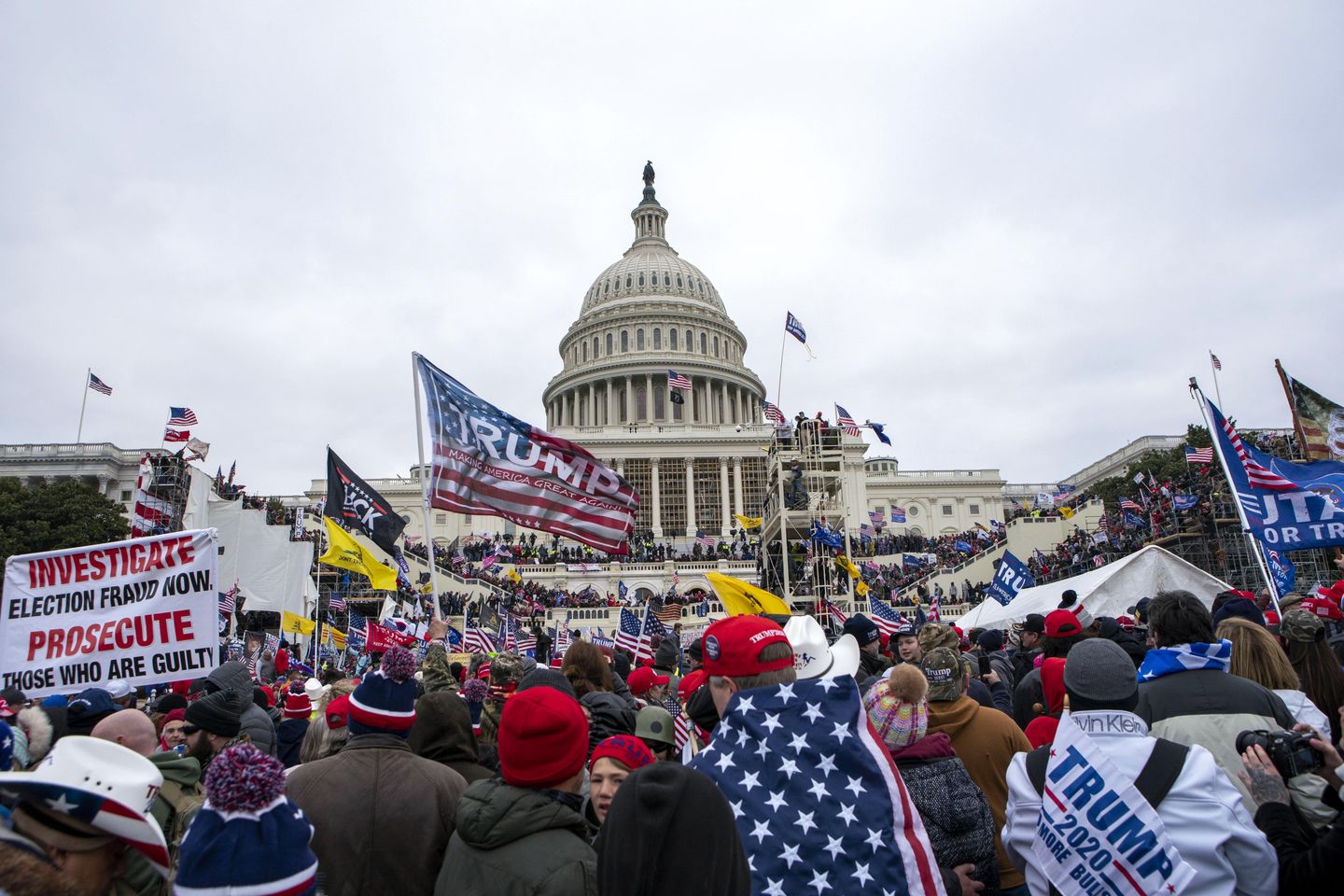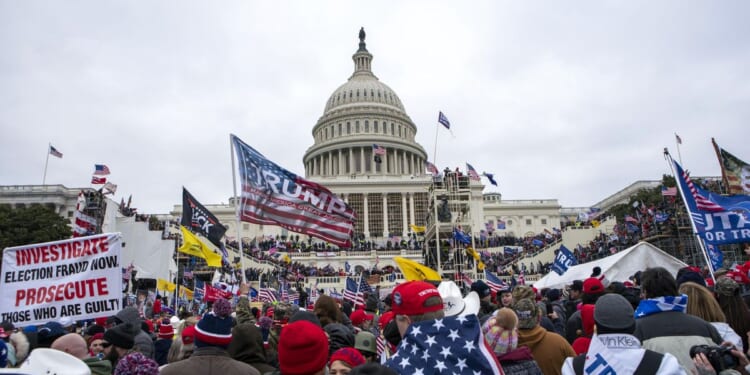
At least two Jan. 6 defendants got out from behind bars because the Supreme Court is reviewing the legitimacy of charging them with obstructing an official proceeding, which is one of the feds’ favorite charges for people who breached the Capitol.
The legal challenge brought by Jan. 6 defendant Joseph Fischer accuses prosecutors of using an overly broad interpretation of “obstructing an official proceeding” to launch hundreds of cases stemming from the Capitol riot, including against former President Donald Trump.
The case will be argued before the high court in the spring with a decision expected by the end of June. But until then, at least two defendants successfully petitioned for early release pending the decision.
More are lining up for a chance to get out of jail while the justices sort it out.
Prosecutors have charged more than 300 of nearly 1,000 Jan. 6 defendants with violating the obstruction statute. At least 152 people were convicted or pleaded guilty to obstructing an official proceeding and more than 100 have been sentenced, according to a tally by The Associated Press.
On Jan. 10, U.S. District Judge Amit P. Mehta ordered the release of Thomas Adams Jr., who was convicted of obstructing an official proceeding, while the Supreme Court reviewed the issue.
Adams was sentenced to 14 months in prison and three years of supervised probation. He has been in custody since August 2023.
The judge reasoned that Adams wouldn’t flee the country and that it was possible the Supreme Court would side with Mr. Fischer, which would also vacate Adams’ conviction.
“The Supreme Court‘s decision to review Fischer means, at a minimum, that this case poses a ‘close question,’” Judge Mehta wrote.
Adams’ attorney told the court that releasing him would not cause a delay or pose a flight risk and his incarceration period could be decreased if his felony charge is vacated.
The government argued against releasing Adams, telling the judge Adams was convicted and had no right to be free on bail.
Prosecutors also said he was convicted of other charges that carry jail time.
“The nature and circumstances of Adams’ offenses were of the utmost seriousness. After entering the Capitol building by walking over broken glass from a window that fellow rioters had smashed, Adams pushed past a line of police and moved with other rioters upstairs to enter the Senate Floor, where he recorded on his cellphone for several minutes before being ejected by police,” prosecutors wrote in their filing.
Another Jan. 6 defendant, Alexander Sheppard, successfully petitioned for early release in light of the Supreme Court taking the Fischer case.
Sheppard was convicted on the same charge of obstructing an official proceeding, as well as other misdemeanors. He has been incarcerated since November on a 19-month sentence.
U.S. District Judge John D. Bates ordered Sheppard released in May after serving just six months due to the high court‘s review of the contested felony obstruction charge.
“The Court agrees with Sheppard’s contention that the Supreme Court‘s grant of the cert petition raises a ‘substantial question’ as to the validity of his … conviction,” wrote Judge Bates.
Kevin Seefried and John Strand, two Jan. 6 defendants, have also asked to be released based on the high court‘s review of the obstruction charge. Their motions are pending.
Theodore Cooperstein, an appellate lawyer representing Jan. 6 defendants, said others facing the same charge who have been convicted but not yet sentenced may be able to put their proceedings on hold too.
“That is just a real precautionary move to make sure nobody ends up serving more time than they should,” he said.
The Fischer case underscores how broadly the government applied the charge to demonstrators who entered the Capitol on Jan. 6.
Mr. Fischer, a former police officer in Pennsylvania, attended President Trump‘s “Stop the Steal” rally near the White House on Jan. 6, 2021. He did not immediately join the demonstration-turned-riot at the Capitol or enter the Capitol building.
He and a companion left town briefly but later returned to the Capitol grounds and entered the building, though after the electoral vote count in Congress had been suspended.
Mr. Fischer was inside the Capitol for about four minutes, according to court records.
Video captured him handing handcuffs to an officer and patting him on the shoulder. Mr. Fischer was later pepper sprayed in a crowd of protesters.
Federal authorities charged him with several counts related to the Jan. 6 attack, including an obstruction charge under Title 18 Section 1512, which pertains to tampering with a witness, victim or information, including the destruction of documents used during an official proceeding, and the obstruction or influence of an official proceeding.
Anyone convicted under the statute could face a fine and up to 20 years in prison.
A lower court judge dismissed the obstruction charges, ruling that prosecutors had used the law too broadly and that it only applied to actions taken with documents or records. A divided panel of the U.S. Circuit Court of Appeals in Washington reversed that ruling and reinstated the charges, prompting an appeal to the Supreme Court.
The law in question is part of the Sarbanes-Oxley Act that regulates financial record keeping and documentation. It applies to anyone who corruptly “alters, destroys, mutilates, or conceals a record, document, or other object, or attempts to do so, with intent to impair the object’s integrity or availability for use in an official proceeding; or otherwise obstructs, influences or impedes any official proceeding, or attempts to do so.”
Congress passed the Sarbanes-Oxley Act of 2002 after the Enron accounting scandal. It was intended to preserve evidence for federal investigations.
Special counsel Jack Smith charged Mr. Trump with obstructing an official proceeding as part of the election tampering case that will go to trial in Washington. Mr. Trump‘s lawyers have not weighed in on the Fischer challenge.
The former president has asserted presidential immunity negates the federal criminal charges, and the D.C. Circuit Court of Appeals is reviewing that claim.
About 1,200 people have been charged with crimes related to the Jan. 6 attack, and more than 700 of the defendants have pleaded guilty.












